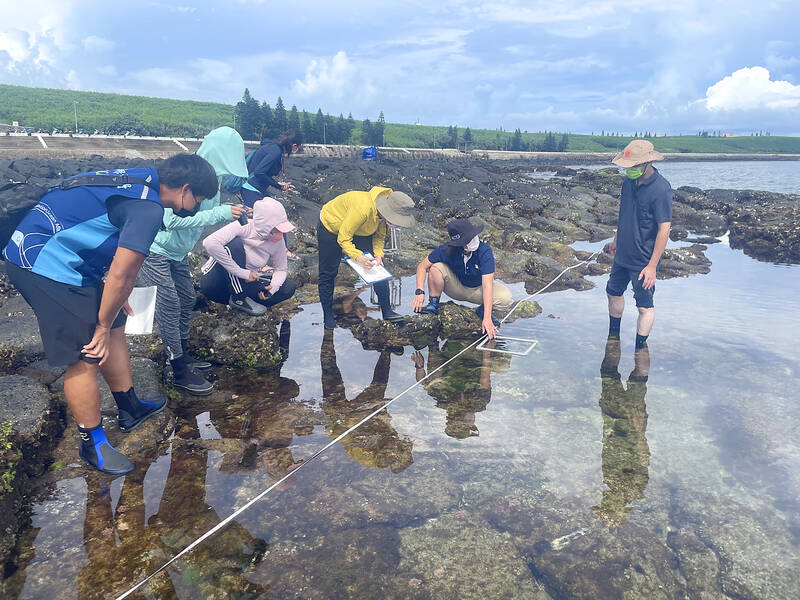About half of the nation’s marine protected areas are completely or highly protected, the Ocean Conservation Administration (OCA) said on Friday, as it aims to meet international conservation goals.
The findings were from a comprehensive survey last year of all 45 protected marine zones around the nation, conducted for the first time in the agency’s history, it said in a statement.
Among them, seven were considered “completely protected,” while 18 were “highly protected,” it said.

Photo courtesy of the Ocean Conservation Administration
Nine were “moderately protected” and 11 had a low level of protection, it added.
The seven completely protected areas were Indo-Pacific humpback dolphin habitats along the west coast, Kenting National Park, Dongsha Atoll National Park, South Penghu Marine National Park, Wanghaixiang Chaojing Bay, the Fushan Aquatic Organisms Propagation and Conservation Zone, and the Penghu South Sea Columnar Basalt Nature Reserve.
These reserves have comprehensive management plans, regular ecological surveys and complete fishing bans, the OCA said.
The poorly preserved areas have labor shortages and lack resources to assist with conservation, it said.
The OCA in 2021 surveyed 22 zones after establishing a set of evaluation criteria, it said, adding that last year was the first time it evaluated all 45 areas.
The point of the survey was not to give points to each area, but to better understand the state of management in the nation’s marine protection areas to serve as a basis for improvement, it said.
For example, after the Shitiping Aquatic Organisms Propagation and Conservation Zone off Hualien County received a poor rating in 2021, the OCA and local communities worked together to draft a plan, and to conduct a survey and patrols for giant clam populations, it said.
The Keelung City Government cooperated with the OCA to conduct patrols in the Keelung City Aquatic Plants and Animals Conservation Area, significantly improving oversight, it added.
The UN Convention on Biological Diversity last year adopted a goal to protect 30 percent of the ocean by 2030, which Taiwan is striving to achieve, OCA Director-General Huang Hsiang-wen (黃向文) said.

The first global hotel Keys Selection by the Michelin Guide includes four hotels in Taiwan, Michelin announced yesterday. All four received the “Michelin One Key,” indicating guests are to experience a “very special stay” at any of the locations as the establishments are “a true gem with personality. Service always goes the extra mile, and the hotel provides much more than others in its price range.” Of the four hotels, three are located in Taipei and one in Taichung. In Taipei, the One Key accolades were awarded to the Capella Taipei, Kimpton Da An Taipei and Mandarin Oriental Taipei. Capella Taipei was described by

EVA Airways today confirmed the death of a flight attendant on Saturday upon their return to Taiwan and said an internal investigation has been launched, as criticism mounted over a social media post accusing the airline of failing to offer sufficient employee protections. According to the post, the flight attendant complained of feeling sick on board a flight, but was unable to take sick leave or access medical care. The crew member allegedly did not receive assistance from the chief purser, who failed to heed their requests for medical attention or call an ambulance once the flight landed, the post said. As sick

Minister of Economic Affairs Kung Ming-hsin (龔明鑫) yesterday said that private-sector refiners are willing to stop buying Russian naphtha should the EU ask them to, after a group of non-governmental organizations, including the Centre for Research on Energy and Clean Air (CREA), criticized the nation’s continued business with the country. While Taiwan joined the US and its Western allies in putting broad sanctions on Russia after it invaded Ukraine in 2022, it did not explicitly ban imports of naphtha, a major hard-currency earner for Russia. While state-owned firms stopped importing Russian oil in 2023, there is no restriction on private companies to

INDUSTRY: Beijing’s latest export measures go beyond targeting the US and would likely affect any country that uses Chinese rare earths or related tech, an academic said Taiwanese industries could face significant disruption from China’s newly tightened export controls on rare earth elements, as much of Taiwan’s supply indirectly depends on Chinese materials processed in Japan, a local expert said yesterday. Kristy Hsu (徐遵慈), director of the Taiwan ASEAN Studies Center at the Chung-Hua Institution for Economic Research, said that China’s latest export measures go far beyond targeting the US and would likely affect any country that uses Chinese rare earths or related technologies. With Japan and Southeast Asian countries among those expected to be hit, Taiwan could feel the impact through its reliance on Japanese-made semi-finished products and